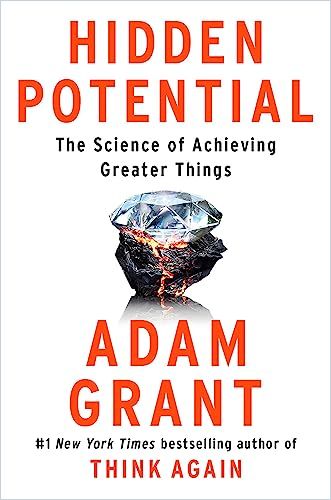Everyone is born with immense potential — but it often remains untapped. Organizational psychologist Adam Grant dismantles common misconceptions about what it takes to become a high achiever, and makes the case that — under the right circumstances — practically anyone can achieve their dreams.

You Can
In 1989, José Hernández applied to become a NASA astronaut — a dream he’d held since he was 10 years old. He’d done everything right. But amid fierce competition for astronaut slots, his application was rejected. Undaunted, Hernández submitted fresh applications at every opportunity, while continuing to upgrade his qualifications: He earned a pilot’s license, gained a SCUBA certification, and attained proficiency in the Russian language.
What Hernández failed to do was inform NASA that he was the son of a migrant farmer and had grown up in poverty. Only when he advanced to become a finalist in NASA’s selection process — after persevering for 10 years — did he speak during an interview about his hardships and the fact that he had had to exercise far more than the usual level of initiative, determination, and discipline to become a NASA candidate.
Hernández’s is the kind of story — engaging, inspiring, and often moving — that Adam Grant deploys to powerful effect in his popular and respected books that explore the psychology of motivation, thought, and innovation. Grant, an organizational psychologist who teaches at Wharton, has earned recognition, fame, and immense influence as a management thinker. In Hidden Potential, he turns his gift for popularizing recent research — in part by pairing it with illustrative stories like Hernández’s — to the subject of individual potential.
Character Counts
Grant sets out his thesis — “Everyone has hidden potential” — in a prologue recounting the story of the Raging Rooks, a group of Detroit kids, all from minority and underprivileged backgrounds, who rocked the chess world in the early 1990s by reaching the finals in the National Junior High Chess Championships. Grant’s point: The Raging Rooks weren’t prodigies, and they didn’t shatter all expectations through sheer dogged work. They prevailed because they possessed character skills: the personal, uniquely human qualities — exemplified by Hernández’s initiative, determination, and discipline — that can enable any person to learn, grow and, potentially, perform at a high level.
Character skills do more than help you perform at your peak — they propel you to higher peaks.
Adam Grant
Nearly anyone can learn to master a field — but it takes more than a mindset, Grant says. People also need solid character skills and conducive learning conditions. Given these, however, the sky’s the limit. Grant quotes a fellow psychologist: “What any person in the world can learn, almost all persons can learn.”
Work Smart — and Play, Too
Grant often poses his research-based ideas as more effectual alternatives, contrasting time-worn myths that often pass as common wisdom. He overturns the notion that high achievers will display their aptitudes early on in life — in a study of 120 top scientists, athletes, musicians, and artists, only a few proved to have shone in childhood — and then takes on the cult of hard work.
Discipline has its place, but hard work can only take you so far, and a drive for perfection can sour into obsessiveness and aversion to extending yourself, Grant argues. He offers an arsenal of gentler approaches and attitudes that research shows have more efficacy when it comes to developing and refining a skill or expertise. These include a willingness to experience discomfort — the price of venturing outside your comfort zone to make valuable mistakes — and absorptive capacity, the ability to evaluate new information, acknowledge its value, take it in, and apply it. Be a sponge for information, Grant counsels.
If we judge people only by what they can do on day one, their potential remains hidden.
Adam Grant
If you’re aiming for excellence, forcing yourself to put in long hours won’t necessarily give you an edge, and you’ll risk becoming physically and emotionally exhausted, Grant says. Instead, tap into your intrinsic motivation: Then, you’ll hone your skills because you genuinely enjoy what you’re doing. Grant turns to elite musicians to illustrate “harmonious passion,” the drive to practice that stems from joy in working toward a goal and feels like play, as opposed to practicing in response to external pressure.
Don’t Try to Go It Alone
Throughout, Grant highlights the importance of scaffolding — structures that make an environment or experience conducive to learning and achievement. Scaffolding can consist of a tactic or technique. To illustrate, Grant points out that in the well-known “marshmallow” test, where young children earned rewards by resisting the urge to eat a marshmallow immediately, the youngsters who lasted longest — and later scored higher on the SAT — didn’t depend on sheer willpower. Instead, they used improvised scaffolds to assist their performance, such as covering their eyes, sitting on their hands, or playing with the marshmallow.
People can serve as scaffolds, too. In a study of high school students, researcher Carol Dweck found the students’ academic achievement increased when teachers helped them nurture growth mindsets. The right mindset helped, but that alone wasn’t enough: The students also needed a teacher who recognized their potential, as well as a learning environment that encouraged them to embrace challenges.
Unleashing Potential
If every person possesses untapped potential, it follows that failing to foster that potential doesn’t just limit the individuals themselves; it also represents an enormous opportunity cost to society — a point that’s not lost on Grant, who notes that although José Hernández eventually achieved his dream of going to space, he succeeded only because he broke through a system designed to overlook people like him.
What look like differences in natural ability are often differences in opportunity and motivation.
Having argued that every person holds unsuspected reserves of possibility for learning, growth, and achievement, Grant implores leaders to create systems that lift people up, provide opportunities, and dismantle the structures that stifle and stymie them. And you, too, have enormous potential within, Grant says. So support yourself in pursuing your dreams by believing in your own potential.









